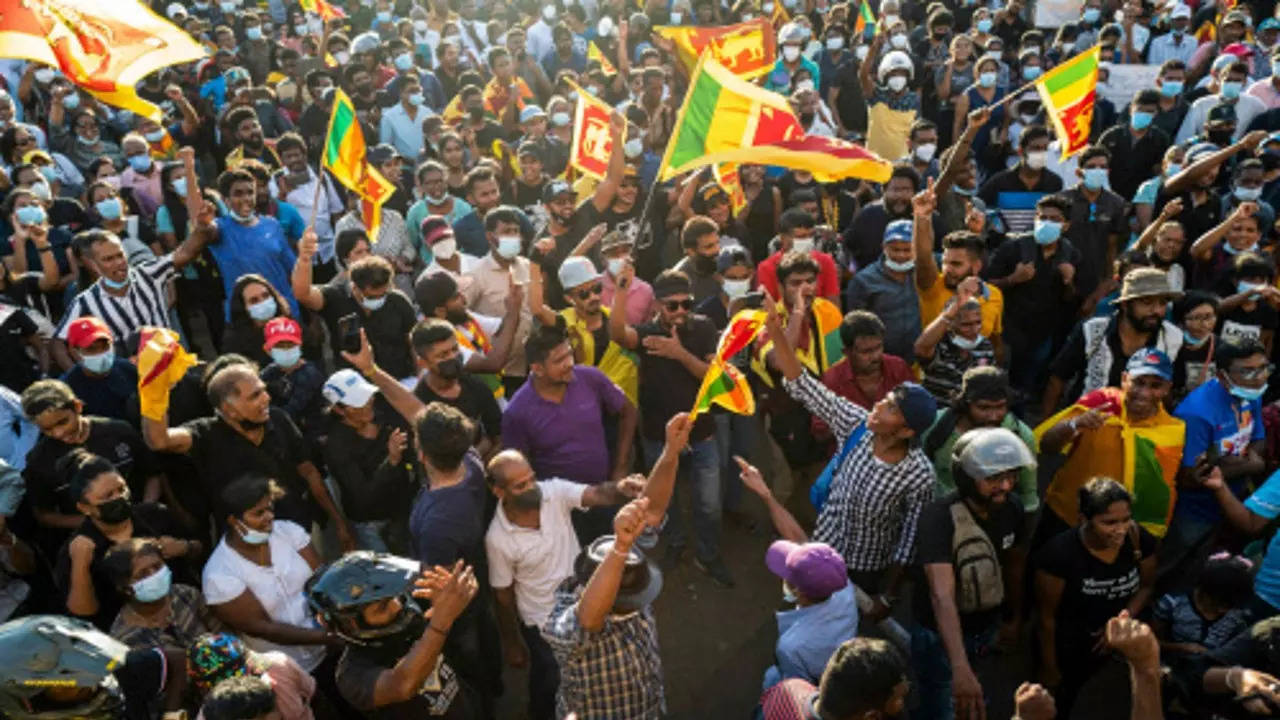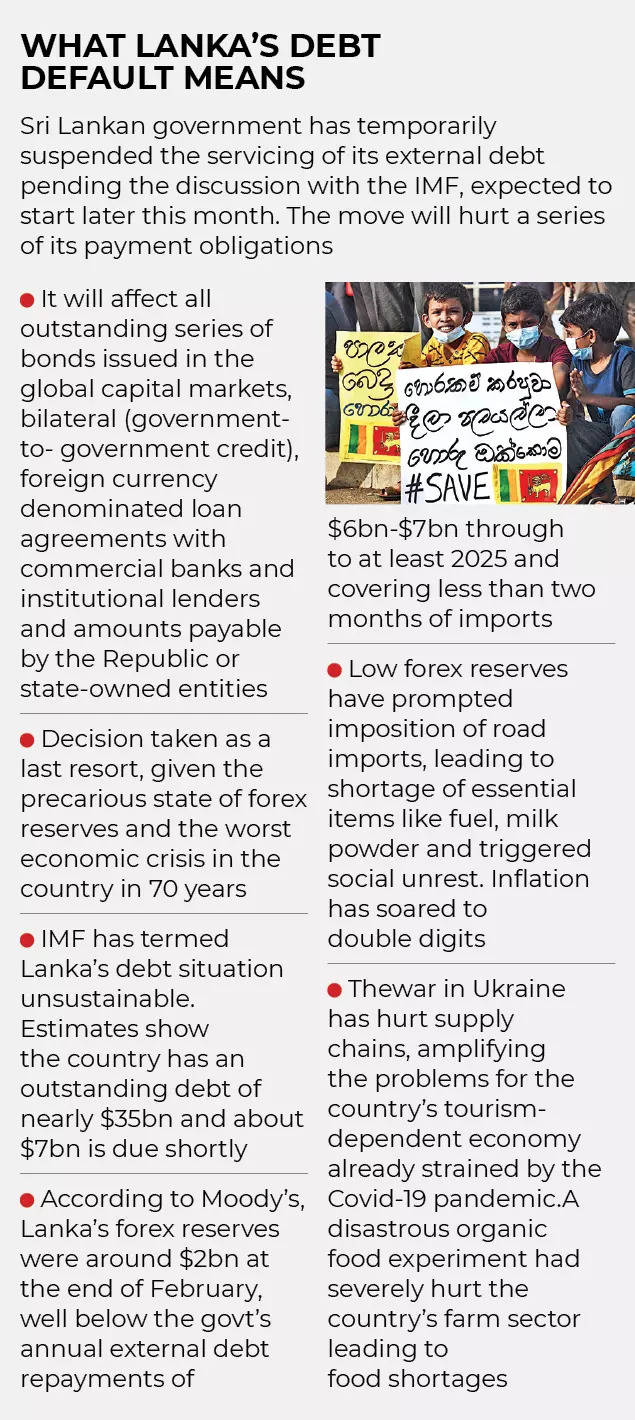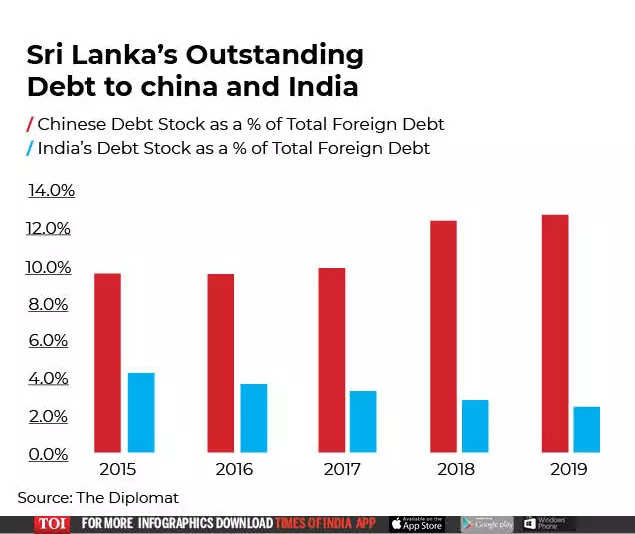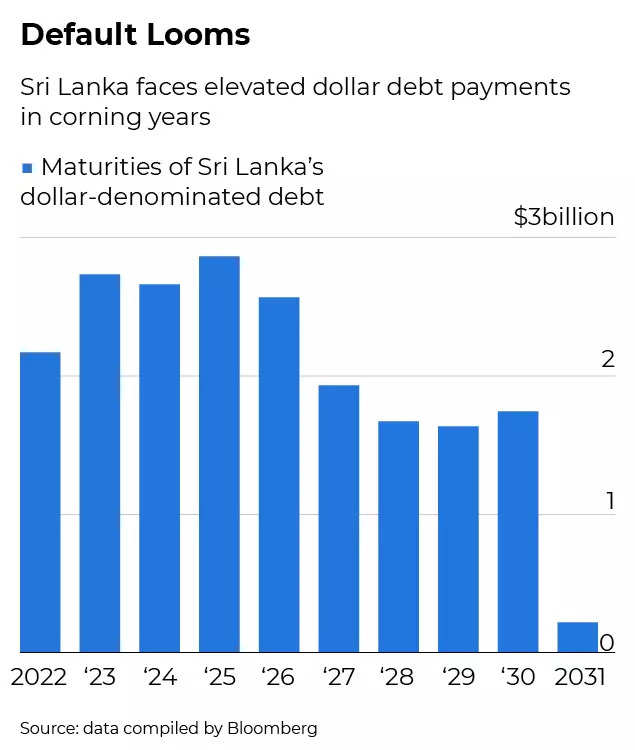
NEW DELHI: Sri Lanka is in the midst of an unprecedented economic crisis which is slowly but surely snowballing into a political crisis that threatens to dislodge the Rajapaksa brothers.
The island nation needs between $3 billion to $4 billion this year to pull itself out of the economic mess.
The extent of the crisis can be gauged from the fact that Colombo has stopped external debt payments to ensure it has enough cash reserves for emergency supplies like fuel, food, gas, medicine and other essential items for its people.

Its economy has been in a free fall ever since the onset of Covid pandemic which led to a halt in tourism, a key source of forex for the country.
Sri Lanka, which has been heavily dependent on external debts to run its economy smoothly, has been bailed out in the past by its competing neighbours - India and China.
In fact, over the years it has intelligently pitched one against the other to extract maximum benefits from both New Delhi and Beijing.
While Sri Lanka's outstanding debt with China is about $3.5 billion - or 10.8% of the total, for India this figure is only around 2%.
The country's increased reliance on Chinese loans has often been depicted as Sri Lanka falling into their debt-trap. While China's debt to Sri Lanka kept on rising, help from India has remained at a constant level.

What's more, Chinese investments in Sri Lanka had been largely governed by strategic interests -- be it on construction of infrastructure or otherwise.
Data shows that market borrowings comprise the majority of Sri Lanka's foreign debt stock.
Asian Development Bank's (ADB) share in Lanka's debt stock is 13 per cent and Japan's 10 per cent.
But China now seems reluctant to do more.
Beijing, which has often been accused by the US of "debt diplomacy" to make developing nations dependent on its help, is currently facing its own economic troubles.
Lockdowns to contain China’s worst Covid outbreak since early 2020 has shut down the technology and financial hubs of Shanghai and Shenzhen.
India ready to help more
On the other hand, India, which has followed the "Neighbourhood First policy" to cement bonds with its neighbours, is ready to walk that extra mile to help Sri Lanka out of the current crisis.
India has so far committed $1.9 billion to the island nation in loans, credit lines and currency swaps.
New Delhi has expressed willingness to give an extra $2 billion in swaps and support to Colombo, even as Beijing keeps Lanka guessing over loans and credit lines.
India's contributions till now
In the last 3 months, India has extended assistance of about $2.5 billion to Sri Lanka, including credit facilities for fuel and food.
Since mid-March, over 270,000 metric tonnes of diesel and petrol have been delivered to Sri Lanka.
In addition, around 40,000 tonnes of rice have been supplied under the recently extended $1 billion credit facility.
This additional $1 billion will help the country to shore up the shrinking economy.
Ahead of the Sinhala and Tamil new year, India sent a shipment of 11,000 MT of rice to help people of Sri Lanka celebrate one of their biggest festivals.
In February, $500 billion was given to Sri Lanka by India as a short-term loan to help it purchase petroleum products through the ministry of energy and the Ceylon Petroleum Corporation on behalf of the government of Sri Lanka.
In November 2021, India had given 100 tonnes of nano nitrogen liquid fertilizers to Sri Lanka as their government stopped the import of chemical fertilizers.
Besides, the Reserve Bank of India (RBI) has extended a currency swap of $400 million and deferred payments owed by the Central Bank of Sri Lanka under the Asian Clearance Union worth several hundred million dollars.
On April 10, India sent vegetables and daily ration items to Colombo as an aid to the people of the nation who are battling on a regular basis to procure essential items like food and medicine amid soaring inflation rates.
It has also sent ships with sugar, rice and wheat -- items of which it has a surplus.
Ministerial meet on cards?
Newly-appointed Sri Lanka finance minister Ali Sabry is expected to meet an Indian ministerial delegation in Washington next week, on the sidelines of the International Monetary Fund (IMF) meetings, to firm up a fresh round of assistance from New Delhi, the Economic Times reported.
It further said Sri Lanka’s presidential advisory group on multilateral engagement and debt sustainability, its Central Bank governor and treasury secretary are engaged in discussions with India, which is being represented by the chief economic adviser and the economic affairs secretary.
According to some Sri Lankan officials quoted by ET, the two sides could establish a framework to monitor progress of economic cooperation in the present context.
Lankan hopes pinned on IMF help
Sri Lanka has been downgraded deeper into junk by Fitch Ratings, which said on Wednesday the nation’s decision to suspend payments on its foreign debt has kicked off a sovereign default process.
S&P said Sri Lanka’s next interest payments are due on April 18 and the failure to cover them will likely result in default, as would an outright debt restructuring.

The desperate island nation is due to formally start loan negotiations with the International Monetary Fund.
Talks with IMF are scheduled to begin in Washington on April 18 and Colombo expects emergency relief funds a week later, if things go well.
"The nation is looking at making a “decent case” before the IMF to help preserve the economy," Lanka's finance minister Ali Sabry said in an interview to Bloomberg Television’s Yvonne Man and David Ingles.
“Our appeal to them is to release it as soon as possible,” Sabry said.
Sabry, along with newly appointed central bank governor Nandalal Weerasinghe, is a key member of the team for bailout talks with the IMF. The funds are crucial to the success of a debt restructuring process initiated by the island nation this week after suspending some outstanding loan and interest payments.
Sabry also sought to reassure investors of the nation’s intent to repay loans.
“What we have very categorically stated, across the board, is that we will honor our debt,” he said. “The commitment is there, the desire is there, but we don’t immediately have the funds to disburse.”
The IMF’s involvement should help negotiations with bond holders, Citigroup Global Markets analysts Donato Guarino and Johanna Chua wrote in a note to clients. They see Sri Lanka asking investors to take a haircut of 50% on interest payments, and 20% on the principal, with an exit yield of 11%.
Sri Lanka is looking at bridge financing options, and is confident it can secure aid from countries including China and India, Sabry said. That effort would be accompanied by fiscal reforms to curtail expenditure and boost revenues, he said.
Sri Lanka has witnessed massive street protests in the last few days in view of the economic crisis. The public anger has led almost all the cabinet ministers to quit the government. There have been growing calls for resignation by President Gotabaya Rajapaksa and Prime Minister Mahinda Rajapaksa.
The present crisis in Sri Lanka presents India an opportunity to limit Chinese influence and involvement in the island nation.
(With inputs from agencies)







